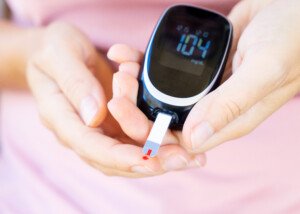
Who’d ever think that poor sleep or insomnia can actually cause insulin resistance? But it can.
Insulin resistance is associated with obesity, even being moderately overweight, lack of exercise and poor diet. It can lead to type 2 diabetes.
But a person who works out like a warrior, has a strict diet, and is a lean, mean athletic machine, can still end up with insulin resistance if he or she gets poor quality sleep.
“There is a strong association between sleep disorders and both obesity and insulin resistance,” says Dr. David Edelson, MD, board certified in internal and bariatric medicine, one of the top obesity experts in the U.S., and founder and medical director for thin-site.com and HealthBridge.
“When I refer to sleep disorders, I am speaking of anything that can cause either a lack of sufficient quantity of sleep (insomnia, lifestyle issues) or poor quality (sleep apnea, restless legs, fragmented REM sleep, etc.).”
Lifestyle issues include anxiety levels that keep a person tossing and turning, unable to slumber for more than several hours at a time.
Dr. Edelson continues, “The basic problem is that the body requires a certain amount of deep cycle sleep to restore its normal functions after a full day of activity.”
There are two phases of restorative sleep: REM (the dream stage) and slow wave.
“During these phases the body undergoes repair and rejuvenation, restoring depleted hormones and repairing damaged tissues,” says Dr. Edelson.

“If someone has poor sleep quality or quantity, these processes will not occur to a sufficient degree.
“Over time this can result in a multitude of medical issues, including obesity, insulin resistance, hypertension, heart failure, arrhythmias, immune disorders, and the list goes on.”
Insulin resistance can even be caused by just one night of poor sleep, according to a study that was reported in the Journal of Endocrinology & Metabolism (2010).
“Our findings show a short night of sleep has more profound effects on metabolic regulation than previously appreciated,” says Esther Donga, MD, of the Leiden University Medical Center in The Netherlands, and the study’s lead author, in the report.
“Our data indicate that insulin sensitivity is not fixed in healthy subjects, but depends on the duration of sleep in the preceding night.”
Millions of people have obstructive sleep apnea (OSA) and don’t even know it.
Though obesity is associated with this life-threatening condition, not all patients are overweight, and it can affect children, though not commonly.
If you’ve been diagnosed with OSA, you may have insulin resistance.
“As the patient falls into the deep stages of sleep, the muscles around the airway relax and the breathing becomes obstructed,” says Dr. Edelson.
“Oxygen levels fall as the patient literally is choking, and in most cases he/she snaps out of the deep stage sleep into a lighter stage.
“This can happen over 100 times an hour in severe cases, with oxygen levels falling to 60 percent of normal.”
As frightening as this sounds, and as life-threatening as it is (dramatically increasing risk of heart attack and stroke), you can have this disorder and be completely unaware, especially if there’s nobody with you overnight to hear your snoring — a classic symptom of the condition. An overnight oxygen level test will confirm diagnosis.
A questionnaire on thin-site.com, called the Epworth Scale, can evaluate your risk of having OSA.
If you turn out to be diagnosed with OSA, insist on being screened for insulin resistance.
Dr. Edelson says, “Restoring good quality sleep is often one of the most powerful things that can be done to improve a patient’s overall health,” including lowering the risk of insulin resistance, or reversing it if you already have it.
If You Can Retire, Do So! You’ll Sleep Much Better.
Retirement leads to better sleep and improves insomnia, while continuing to work doesn’t.
There’s fewer sleep disturbances and insomnia once a person retires, but this improved sleep isn’t so much from the benefits of retirement, as it is from the removal of the stress of having a job—so says a study that’s reported in the journal Sleep (2009).
The researchers (lead by Jussi Vahtera) found that the chances of having poor sleep during the seven years following retirement were 26 percent lower than in the seven years before leaving the workforce for good.
This post-retirement improvement was greatest in the study participants who were in management jobs, people who had reported jobs with high psychological demands, and those who worked nights.
So remember that if your concerned about poor sleep leading to insulin resistance.










































